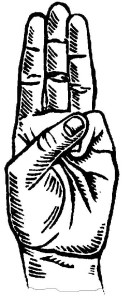Thanks to this book, young boys began to take interest in the new skills that had learnt and the movement began to gather speed and take root, starting with boys starting patrols themselves and then banding together and seeking adult leadership. Troops began to form, regular meetings became a weekly occurrence and scout districts began to form.
 By 1st September 1909, The movement had already proved so popular that a cartoon was published in a very popular magazine called Punch. It became very quickly apparent, that a headquarters was necessary and a boy scout office was made available by Pearsons, The publishers, in Henrietta street, London, and permanent offices in Victoria street. Almost ten years later, even larger premises were needed so the Headquarters were moved to 25 Buckingham Palace road, which in 1918 became known as the Imperial Headquarters or more commonly known as 'The Ivory Towers'.
By 1st September 1909, The movement had already proved so popular that a cartoon was published in a very popular magazine called Punch. It became very quickly apparent, that a headquarters was necessary and a boy scout office was made available by Pearsons, The publishers, in Henrietta street, London, and permanent offices in Victoria street. Almost ten years later, even larger premises were needed so the Headquarters were moved to 25 Buckingham Palace road, which in 1918 became known as the Imperial Headquarters or more commonly known as 'The Ivory Towers'.The growth wasn't only in Great Britain but had also spread to the rest of the world with Chile being the first overseas nation to take up scouting. they were very closely followed by Australia, South Africa, Canada, New Zealand and Gibraltar. The growth continued onwards around the globe and by 1922 there were over one million scouts worldwide. Not only was this down to the book series but also Baden-Powell's speaking tours (one of which, in the west Indies in 1912, resulted in Baden-Powell meeting his wife, Miss Olave St. Clair Soames).
1910 also saw the beginnings of the Girl Guide movement. This was a result of a party of young ladies, who were smartly dressed in scout hats, scarves and bearing their 'poles', who appeared at the scout movement's first big public demonstration, at crystal palace, and saying to B-P, 'Please Sir, We are the Wolf patrol of the Girls Scouts, and we want to do scouting like the boys'.
 Pressure came from scouts younger brothers, and this resulted in the wolf cubs or cub scouts in 1916.
Pressure came from scouts younger brothers, and this resulted in the wolf cubs or cub scouts in 1916.A Permanent camp site was next on the list of wants and extensive enquires were made. this resulted in a prime site of 55 acres on the edge of Epping forest which was almost ideal. The whole Gilwell estate was purchased swiftly by William de Bois McLaren who promptly gave the land over to the movement as a kind gesture. over the Easter weekend of 1919, a party of scouts camped over at the estate (in the pigsty to be precise which is still standing today) and began work on redeveloping the site into what has become known as the spiritual home of world-wide scouting.
Since these very first days of scouting, the movement has been growing and growing in to what it has become today, with thanks to the many, many volunteers and scouts from every section. As of 2013 in the UK alone, there were 433,850 scouts (6 to 25) and 83,511 adult volunteers (18+) with a further 38,000 young people waiting to enrol in the programs. The UK is also the first nation to allow any person to join the movement with out taking in to account of their gender, race or sexuality.
Scouting has also been true to its roots ever since day one with the laws and promise, barely changing apart from slight variations over the years.
Below is the Law and promise:

On my honour, I promise that I will do my best,
To do my duty to God and to the Queen,
To help other people,
And to keep the Scout Law.
There are slight variations on the promise which allows for different faiths and religions to still make their promise.
Lastly, I'd like to finish this post off with saying please try to make your day more enjoyable than the last and to 'BE PREPARED' in what ever you do and to ensure your ready for what ever life throws your way.



No comments:
Post a Comment